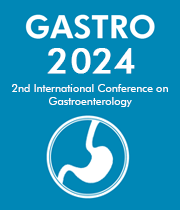Title : Gastric epithelial attachment of helicobacter pylori induces EphA2 and NMHC-IIA receptors for epstein-barr virus
Abstract:
Epstein-Barr virus (EBV)-associated gastric cancer belongs to 1 of the 4 subtypes of gastric cancer and accounts for 10% of the total gastric cancers. However, most cases of gastric cancer have a history of Helicobacter pylori (H. pylori) infection. Therefore, we investigated the possibility that H. pylori infection promotes of EBV-associated gastric cancer. H. pylori was exposed to the principal EBV receptor, CD21- negative gastric epithelial cells, and then infected with recombinant EBV expressing the enhanced green fluorescent protein. Changes in EBV infectivity due to prior H. pylori exposure were analyzed using flow cytometry. The treatment of gastric epithelial cells with H. pylori increased the efficiency of EBV infection.
An increase was also observed when CagA-deficient VacA-deficient and FlaA-deficient H. pylori strains were used, but not when cag pathogenicity island-deficient H. pylori was used. The treatment of epithelial cells with H. pylori induced the expression of accessary EBV receptors, EphA2 and NMHC-IIA, and increased the efficiency of EBV infection depending on their expression levels. When gastric epithelial cells were treated with EPHA2 or NMHC-IIA siRNA, EBV infection via H. pylori attachment was decreased. The adhesion of H. pylori induced the expression of accessary EBV receptors in gastric epithelial cells and increased the efficiency of EBV infection.
Audience Take Away:
-
The biological interaction between H. pylori, EBV and gastric epithelial cells in the gastric carcinogenesis
-
The molecular mechanisms of EBV associated gastric carcinogenesis
-
This research output can help other research to perform detailed investigation for prevention and control of gastric cancer
-
EBV is the second important pathogen next to H. pylori, therefore prevention and control of gastrointestinal disease should consider this as an important factor
-
This research help in promoting the improved diagnosis and treatment of gastric cancer
-
The research data benefits researchers, the clinicians and the general public



